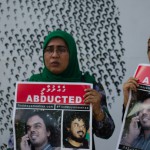Minivan News spends 15 Minutes with Mr. Gary Streeter, a British MP and Chairman of the Conservative Party’s new human rights commission. He told Minivan News why Britain’s main opposition party is so concerned about what is going on in the Maldives.
MN: Could you explain a little about who you are and what the Conservative Party’s new Human Rights Commission is all about?
GS: My name is Gary Streeter and I’m a Conservative Member of Parliament in Britain and I’ve been an MP for 13 years and for the last five years taken a specialist interest in international affairs of one kind or another.
Earlier this Autumn, our shadow foreign secretary Dr Liam Fox, because we have a Labour [party] government at the moment so the Conservatives are in opposition, asked me to set up and chair a new thing for the Conservative Party, a human rights commission, which is intended to look around the world and monitor human rights records of any states that we are concerned about with a view to shaping our foreign policy baring in mind how governments around the world treat their own people. We are just getting going and it’s been drawn to my attention that there are problems in the Maldives and that is what we have been trying to raise here as an issue.
MN: What are the concerns that you have about the Maldives at the moment?
GS: Here in Britain we think of the Maldives as paradise on earth and lots of people go there for a spectacular holiday and get married and all sorts of things and I’m sure that won’t change but we are concerned a recent reports that the current government are not allowing room for democracy to breathe in the Maldives and in particular the leader of the main opposition party Mohamed Nasheed [was] recently arrested and standing trial for terrorism charges and other offenses. I wasn’t present at the peaceful vigil in Male’ in August when he was arrested, but it sounds from many of the things that I’ve heard that these charges may not be entirely well-founded.
It’s not for us to say whether he is guilty or innocent. Our main concern is: is he going to get a fair trial? And from the report of some independent UK lawyers who went to Maldives in September [Sir Ivan Lawrence Commission], which I’ve read very carefully, it does seem that that is highly unlikely. We think that that is a breach of international human rights and we are calling upon Maldives government to make sure that Mohamed Nasheed does receive a fair trial and gets justice.
MN: What do you think the Conservative Party can do to help secure Nasheed a fair trial and also push forward the democratic processes in the Maldives?
GS: Well, the Conservative Party at the moment can do two things. One is to raise the issue here and make a noise about it, and that is what we plan to do. And secondly, to put our own government, the British government, under pressure to put the Maldivian government under pressure to improve its performance on human rights.
That is the reality of the world in which we live. Bigger governments, particularly when there are aid and trade transactions which are of relevance and bearing in mind that 100,000 Brits go to the Maldives every year, we can put other governments under pressure to give their own people the freedom and to treat them decently as we would expect people to be treated here in the West and in Britain in particular.
I think the other thing that I would point out is that the Maldives are a Commonwealth country and of course Britain is a big player in the Commonwealth and we would hope that the Commonwealth can put the Maldivian government under pressure.
Again, it’s not for us to tell any government how to run its affairs but we don’t like the thought that people’s human rights and access to a fair trial are being abused and we very much hope that that can be put right.
MN: Could I ask you as a party, whether you think Tony Blair’s Labour government is doing enough to promote human rights in the Maldives?
GS: I don’t want to be critical of Tony Blair and his government. They’ve got plenty on their plate and in many ways we support some of the efforts they’ve made to stand up for human rights around the world and some of these situations are very complicated. So I’m not really here to criticize Mr. Blair’s government at this stage but more can always be done.
And the way the world works is if we parliamentarians and opposition parties put our own governments under pressure that will hopefully persuade them to take an even greater stand and to put even more pressure on the individuals who are behind the kind of human rights abuses that we can no longer find acceptable in the 21st century.
I hope Mr. Blair and the Foreign Secretary will take an even tougher line. I very much hope that the President of the Maldives will listen to that and recognize that the eyes of the world are upon him at this time and its up to him how he conducts his own affairs but let’s make sure that everybody gets a fair trial and that’s all we are calling for.





